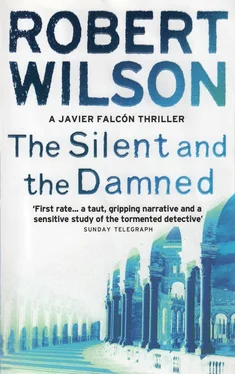Cristina Ferrera knocked on the door.
'There's a postbox in the name of Emilio Cruz in the post office in San Bernardo,' she said. 'But don't get too excited. It's empty and there's been nothing in it since last year.'
'What sort of mail used to arrive there for him?'
'He remembers there being a letter every month with US stamps on it.'
'Anything on Alberto Montes?'
'Nothing yet,' she said, closing the door.
The two men turned back to the window.
'What did the letter to his wife say?'
' "I'm sorry… forgive me… I've failed…" – the usual shit,' said Ramírez.
'Anything about being protected or looked after?'
'At the end he said: "Don't worry, you'll be well looked after,"' said Ramírez. 'Are we being paranoid here?'
'And his second in command, his inspector? Did he have anything to say.'
'Nothing. Shocked by the whole thing.'
'Just like the rest of the squad,' said Falcón. 'If he was on the take, he was doing it on his own.'
'And if he was on the take he's got to keep it somewhere. He's also got to let his wife know where it is and she's got to go and collect it or do something with it.'
'I'm going to make my verbal report to Comisario Elvira now,' said Falcón. 'Find out who Montes used as a lawyer.'
Before Falcón could make his verbal report, Elvira had a photocopy of the letter made and went through it with one of his pencils as if it was a piece of homework. Falcón stuck to the facts in his report and offered no conjecture.
'I'm going to ask you to venture an opinion, Inspector Jefe,' said Elvira, when he'd finished. 'This is the first suicide we've ever had at the Jefatura. There will be media interest. The Diario de Sevilla has already called.'
'I only knew Montes by sight until last week,' said Falcón. 'I went to ask him about a man called Eduardo Carvajal, whose name appeared in Rafael Vega's address book and whose name I knew from my investigation into the Raúl Jiménez case last year.'
'I know that name,' said Elvira. 'I was working in
Malaga when he was "killed" in that so-called car crash. He was a key prosecution witness in a paedophile case. There was a cover-up, as you probably know. The car was destroyed before it could be investigated and there seemed to be some doubt as to the nature of his head injuries.'
'Montes said that Carvajal was going to make him famous. He'd promised him names. Then he died and, in the end, only four members of the paedophile ring were convicted.'
'I'll tell you something that should not go out of this room,' said Elvira. 'Word came down from politicians to top office here that the Carvajal car accident was not something that should be picked over under any media spotlight.'
'As you can imagine, there were some unpleasant memories for Inspector Jefe Montes at the mention of Carvajal's name,' said Falcón. 'Montes explained that Carvajal was the procurer for the rings and that the source for the children being used was the Russian mafia. There's a link between Rafael Vega and two Russians who are investing in an unusual way in two projects under the umbrella of Vega Construcciones. Interpol subsequently told us that the Russians were known mafiosi. I called Montes to run the names by him on Friday evening. He was drunk. I called him again this morning and he said he was happy to talk about it. Then he jumped out of his office window.'
'According to his psychological assessment, carried out last year, he's had a drink problem since 1998… which was the year of the car crash involving Eduardo Carvajal,' said Elvira. 'He has also not been well in the last eight months.'
'He mentioned kidney stones and a hernia.'
'There was a liver problem, as well, which was making him very sick at times.'
'That adds to the pressure,' said Falcón.
'What do you make of this letter to his squad?'
'I wanted to say one more thing about Montes and Carvajal which relates to the letter,' said Falcón. 'Montes told me about the Russian mafia connection. He gave me an insight into the mafia people-trafficking business. If he has been corrupted and fears being discovered – which, if I'm not mistaken, is what we're talking about here – why should he be giving me that information? When I read the letter I got the feeling that the pressure of not telling had become so great that it was coming out anyway. He hasn't "been able to do the good he intended", which could mean that he has done bad. The "corruption" is possibly what's happened to him. The "oppression" is his guilt. He feels "trapped" and "unable to speak" because he's working against everything he believed in. And the last line about "protect my family" implies some kind of danger to them. I think Inspector Jefe Montes was a good man who made, or was forced to make, a very bad choice and he deeply regretted it.'
'I've asked for your opinion and you've given it to me,' said Elvira. 'It's unusable, of course. Now I want your proof. You realize that this will be unpleasant, Inspector Jefe?'
'You might want to talk to Comisario Lobo about the political implications within the Jefatura of what I would propose,' said Falcón, 'which is that we should look closely at Sra Montes's movements in the next few days.'
Monday, 29th July 2002
Now that Alicia Aguado's involvement in Sebastián Ortega's case was out in the open, Falcón decided to speak to Elvira about his intentions. It had occurred to him that his case for using her was weak and the prison director would obviously prefer to use his own psychologists for the work. He pushed Elvira into speaking to the director on his behalf, citing Alicia Aguado's rapport with the prisoner and her belief in her ability to draw information out. Elvira looked at him steadily throughout, as if he barely believed a word he was saying. He acquiesced silently. Falcón also asked that, due to the shortage of manpower in his squad, somebody else should be used to watch Sra Montes. Elvira said he had his own ideas on that point.
The outer office of the Homicide squad was empty. Ramírez was standing at the window.
'Where's Cristina gone?' asked Falcón.
'She's found a Narcotics guy who thinks he knows how to locate Salvador Ortega,' he said. 'Are you going to tell me about that?'
'What about the postboxes?'
'Just the Emilio Cruz one. None for Montes or Vega,' said Ramírez. 'I've been calling the banks, trying to find a safe-deposit box to fit this key. There's one in the name of Emilio Cruz at the Banco Banesto.'
'That's good,' said Falcón. 'Any news on Montes's lawyer?'
'I spoke to him. He hadn't heard from Alberto Montes in three years. The last time they spoke was to make an adjustment to the will,' said Ramírez, and held up his hand. 'Now you've got to tell me about Salvador Ortega. I know who he is, just tell me why we want to talk to him.'
'Because Pablo used to see him and he might know what the problem was between the brothers,' said Falcón.
'Is that going to help us find Vega's killer?' said Ramírez.
'Think for a moment about how Vega was killed.'
'It was nasty… vindictive. They wanted him to suffer. Mafiosi are like that. They do it to set an example to others who might be thinking of cheating them.'
'That's right, which is why we need to work on clarifying their motive because at the moment all I can see is that Vega was important to their plans,' said Falcón. 'Now, listen to these names and let me tell you that they all knew each other: Raúl Jiménez, Ramon Salgado, Eduardo Carvajal, Rafael Vega, Pablo and Ignacio Ortega.'
'You think there's a paedophile connection,' said Ramírez. 'How do you know the Ortegas knew Carvajal?'
'They were in a shot together on Raúl Jiménez's study wall,' said Falcón. 'And all those names were in
Читать дальше
Конец ознакомительного отрывка
Купить книгу












